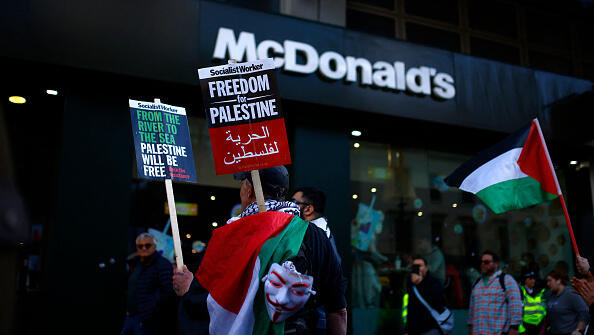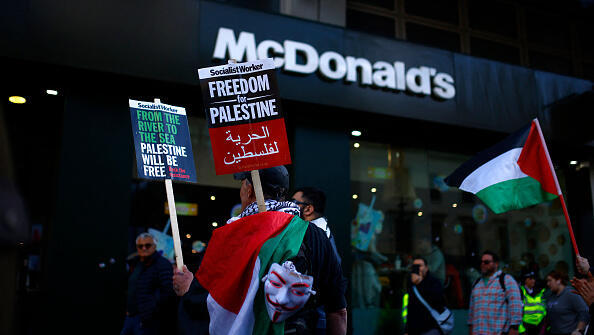
Unhappy meal: Even McDonald's has become too expensive for Americans
Although inflation is declining, American consumers are moving away from fast food chains, and food manufacturers like General Mills are losing customers to private brands. Thriftiness has even reached the wealthy, with luxury brands like Louis Vuitton feeling the impact of rising interest rates on shopping habits in the US.
Fast food chain McDonald's, the largest in the world by number of branches, has become too expensive for Americans in the lower income brackets. To attract customers back, the chain launched a discounted meal for $5 in June, which includes a chicken sandwich or burger, four nuggets, a small portion of fries, and a soft drink. This month, McDonald's, with more than 40,000 locations worldwide, announced that this special offer, initially meant to be temporary, will remain on the menu. Other fast food chains in the country, such as Burger King, Wendy's, and Taco Bell, have adopted similar tactics following a drop in demand.
The pressures on McDonald's profit margins are also being felt globally, though not solely due to consumer thriftiness. Since the Hamas attack on October 7 and the ongoing conflict in Gaza, McDonald's, a symbol of American consumer culture, has faced boycotts in many countries with significant Muslim populations. These boycotts, combined with weakening consumer confidence in the domestic market, have hurt revenues.
1 View gallery


Pro-Palestinian protesters outside a London branch of McDonald's
(Photo: Benjamin Cremel/AFP via Getty Images)
In the second quarter, for the first time since the COVID-19 pandemic, McDonald's recorded a 1% decrease in global sales, largely due to weakening demand, particularly in France, home to Europe's largest Muslim population. The chain also reported a 1.3% decrease in sales in emerging markets, influenced by the war in Gaza and deteriorating economic conditions in China, which led to reduced consumer demand. In the American market, McDonald's recorded a 0.7% decrease in revenues, despite price increases outside the special sale category. In Israel, McDonald's reacquired 225 franchised locations in response to global boycott calls.
Fast food chains are now joining a growing list of companies and brands that have reported a slowdown in demand in recent months, a result of reduced disposable income among American households, especially in lower income brackets, after a prolonged period of high living costs. Even though inflation is trending downward—3% in June compared to 3.3% in May and 3.7% in September—the trend toward thriftiness persists.
This trend is also reflected in the earnings reports of leading food manufacturers. Mondelez, the maker of Oreos, Toblerone, and Milka, reported a 2.2% drop in second quarter revenue compared to the same quarter last year and a 35% decline in net profit. This downturn was attributed to consumers opting for cheaper alternatives—private brands.
Similarly, General Mills reported a decline in quarterly sales last month and warned of macroeconomic uncertainty that is changing consumer preferences, leading them to seek cheaper alternatives to popular brands. General Mills' prominent brands include Nature Valley, Pillsbury, and Cheerios. To try and win back customers from private labels, food companies are preparing to increase promotions and market smaller packages at lower prices.
This trend is not new, but it is gaining momentum. The rise of private brands follows the COVID-19 pandemic, which disrupted years of growth in these products. During the pandemic, consumers rushed to buy familiar and beloved brands after the federal government distributed grants to stimulate the economy. According to a survey by the Food Industry Association, 65% of consumers now prefer private brands due to their lower prices. As a result, leading chains are increasing their investment in private labels. Walmart, the largest grocery chain in the United States and owner of the Great Value brand, introduced a line of upgraded food products this year called Bettergoods, featuring many items priced under $5. The German chain Aldi, where 90% of products are private labels, plans to open another 800 locations in the United States by 2028.
According to the Private Label Manufacturers Association (PLMA), food and beverage private labels helped increase market share in the United States in the first half of 2024. Data collected by the consulting firm Circana, which monitors consumer behavior, revealed a record market share for private labels in the first six months of the year—22.9%. In comparison, annual sales of more expensive national brands increased by only 1.1%.
As daily expenses decrease and luxury spending is reduced, household savings levels in the United States are also trending downward from their peak during the COVID-19 pandemic. According to the Federal Reserve Household Survey released in late May, 54% of American adults have enough savings to cover three months of expenses if they lose their main source of income. These figures reflect a slight decrease compared to a year earlier and a 5% drop from the record level in 2021. This trend is evident across all education levels and ethnic groups.
Economic forecasts are clouded by data from Goldman Sachs economists, who report an increased risk of the US economy falling into recession. New estimates suggest the likelihood of a recession within the next 12 months has risen from 15% to 25%.
PepsiCo, another symbol of American culture, is also suffering from a double blow—a slowdown in domestic consumption and boycotts in Muslim markets. In the United States, many consumers continued to buy PepsiCo’s snacks, such as Doritos and Lay's, in recent years, while cutting back on other expenses like dining out and travel. However, PepsiCo has now reported that consumers are even cutting back on snacks, with the Frito-Lay North American division reporting a 4% drop in sales last quarter. Amid the boycotts, kiosk and store owners in Egypt report a decline in sales of Coca-Cola and PepsiCo soft drinks. Other American brands affected by the boycotts include Ariel, Persil, and Cadbury, which is owned by Mondelez.
The coffee giant Starbucks is also feeling the pressure. In addition to a decline in global activity due to boycotts by pro-Palestinian groups, Starbucks is seeing a drop in U.S. sales, with consumers growing weary of paying $6 for a cup of iced coffee or lemonade. While global sales fell by 3% in the second quarter, North American activity declined by 2%, marking the second consecutive quarterly drop.
The trend of thriftiness among American consumers extends beyond fast food, coffee, and snacks. Recreational and off-road vehicle manufacturer Polaris, which produces boats and ATVs, reported a 49% drop in first quarter revenues. Appliance manufacturer Whirlpool also reported a decline in demand for refrigerators and dishwashers, with consumers now preferring to repair appliances rather than replace them.














